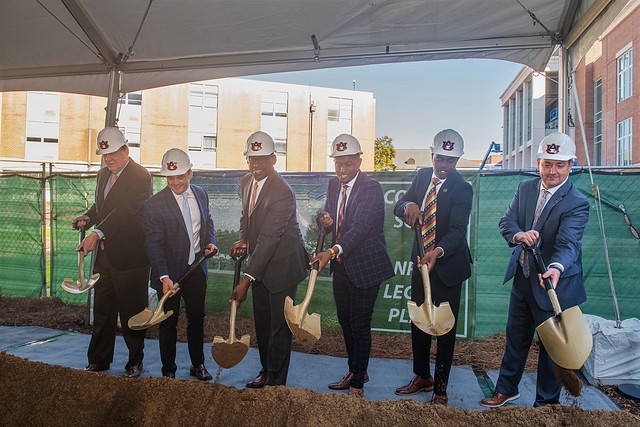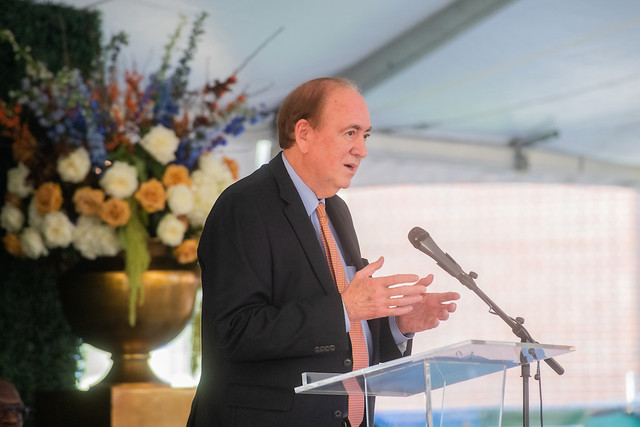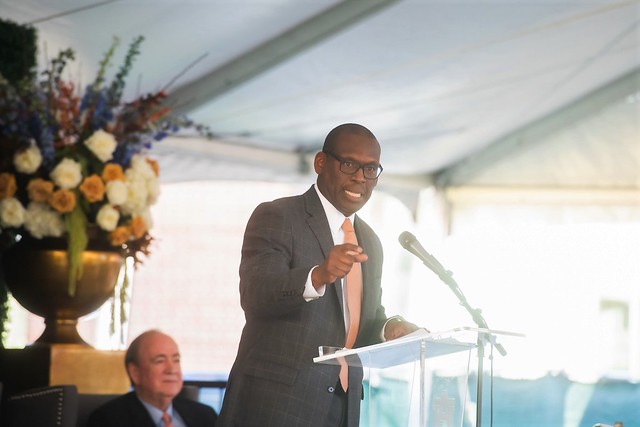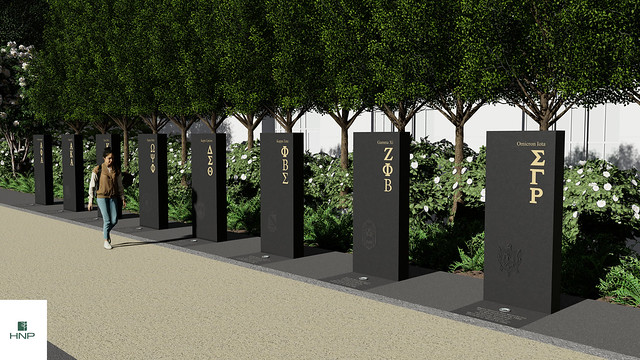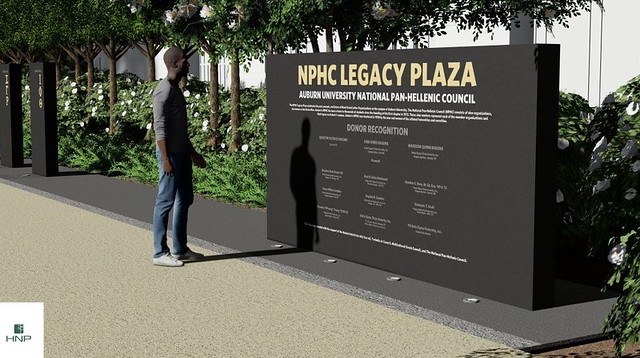Auburn University breaks ground on National Pan-Hellenic Council Legacy Plaza
Article body
Auburn University broke ground Friday on its National Pan-Hellenic Council Legacy Plaza, a symbolic and functional space that will recognize and celebrate the legacy of Black Greek organizations and African American culture at the land-grant institution.
The ceremony took place near Auburn’s recently opened The Edge at Central Dining facility, close to the Campus Green area, Jordan-Hare Stadium and the Academic Classroom and Laboratory Complex that is expected to be completed in spring 2022. Representatives from the National Pan-Hellenic Council, or NPHC—which represents the nation’s Black Greek organizations—were joined by Auburn President Jay Gogue and Board of Trustees members for the special celebration.
“The recent naming or renaming of buildings on campus is part of an ongoing effort by Auburn to honor individuals whose contributions to the university have led to meaningful change and are deserving of such recognition,” Gogue said. “The NPHC Legacy Plaza is one more way Auburn demonstrates it supports an inclusive and diverse campus environment. I am particularly proud of our students coming together to create the first physical landmark on Auburn’s campus for any Black student organization.”
Approved by the Auburn Board of Trustees in July 2020, the NPHC Legacy Plaza will include markers for each of the nine Black Greek organizations that make up the NPHC, as well as one central commemorative marker explaining the plaza’s representation and recognizing the project’s donors. Construction is expected to begin in 2022.
“What an honor it is to be here today for this momentous occasion in the life of Auburn University,” Auburn Board of Trustees member Quentin Riggins said. “With this groundbreaking, we are setting the stage for yet another major milestone in the history of our great institution. As a member of the Board of Trustees, I am so pleased to see this continued movement toward progress, acknowledging the National Pan-Hellenic Council, the Divine Nine’s contributions to Auburn through the years and honoring African American culture at Auburn.
“This day speaks to our commitment to invest in amplifying diverse perspectives and experiences to build an environment in which we all can excel and thrive. And so, as I look to the future and all that this groundbreaking represents, I see a bright horizon of hope—advancing our great university forward and furthering the potential that together, united in purpose, we all can achieve.”
Auburn’s Student Government Association, or SGA, Student Senate unanimously passed legislation in 2018 in support of the NPHC’s campaign to create a legacy plaza at Auburn after then-SGA President Dane Block presented a letter identifying the need for an on-campus plaza. Student leaders, members of the NPHC, the Interfraternity Council and Panhellenic at Auburn, as well as Greek alumni, have pledged financial support for the plaza.
“Now, our campus will have a dedicated space to celebrate the diversity of cultures and traditions among Auburn students,” Auburn NPHC President Jackson Thomas said. “Because of this, the NPHC Legacy Plaza is a huge symbolic step toward making the Auburn Family welcoming to all. It is our sincere hope that it will set the tone for the future of diversity, equity and inclusion at Auburn University.
“The legacy plaza is for the betterment of Auburn and for the betterment of minority students on campus in the years to come. We are very grateful for your support in working toward these goals.”
Of the nine NPHC chapters, five are represented on Auburn’s campus, and the university will join the University of Mississippi as the only Southeastern Conference schools with dedicated NPHC spaces.
“Today marks a very special occasion,” said Julius Hammond, past Auburn NPHC president. “We are all here today because we share a love for Auburn, because this university left an indelible mark on each of us. It is our responsibility to make sure students of all backgrounds and cultures are afforded opportunities for success, and to do that, we must ensure all students are represented equally and feel welcome at Auburn.
“It is our hope that the legacy plaza will forever symbolize the moment in time where Auburn University made a leap toward becoming a campus that unequivocally welcomes all cultures and traditions.”
The plaza will represent the past, present and future of Black Greek organizations at Auburn.
“This project began with the leadership of Julius Hammond and Jackson Thomas and former SGA President Dane Block, but it quickly became a project that was very important to our entire student body,” said Bobby Woodard, senior vice president for Student Affairs. “We work hard to ensure that every student on our campus has the best possible experience at Auburn. It’s important that every student here knows they belong and that they know Auburn is a place where they are supported, valued and positioned for success.
“The realization of the legacy plaza demonstrates that our students share those goals. This is a very special occasion for the NPHC organizations on campus, and it’s a significant step toward an Auburn Family where everyone truly belongs.”
Block, who now does investment banking for Dallas-based Stephens Inc., was on-hand Friday to see the next step of the project take shape and is excited to see his efforts and the efforts of other Auburn student leaders come to fruition.
“This is a project that is long overdue and that has been in the works for a very long time, so it’s a huge collective effort over a lot of years,” Block said. “So many students from all parts of campus had a hand in this, and they all came together and unified around one common goal. I’m very excited for Auburn University to take this step forward and recognize the work that’s been done by so many people and celebrate that.
“This is one, small step toward a better future, and it’s a call to action for students to come together with an idea, put together the resources and really push forward what they want to see. It’s a call to action to continue moving forward toward a more inclusive environment for everyone.”
Related Media
Media interested in this story can contact Communications Director Preston Sparks at (334) 844-9999 or preston.sparks@auburn.edu.
Auburn University is a nationally ranked land grant institution recognized for its commitment to world-class scholarship, interdisciplinary research with an elite, top-tier Carnegie R1 classification, life-changing outreach with Carnegie’s Community Engagement designation and an undergraduate education experience second to none. Auburn is home to more than 30,000 students, and its faculty and research partners collaborate to develop and deliver meaningful scholarship, science and technology-based advancements that meet pressing regional, national and global needs. Auburn’s commitment to active student engagement, professional success and public/private partnership drives a growing reputation for outreach and extension that delivers broad economic, health and societal impact.



